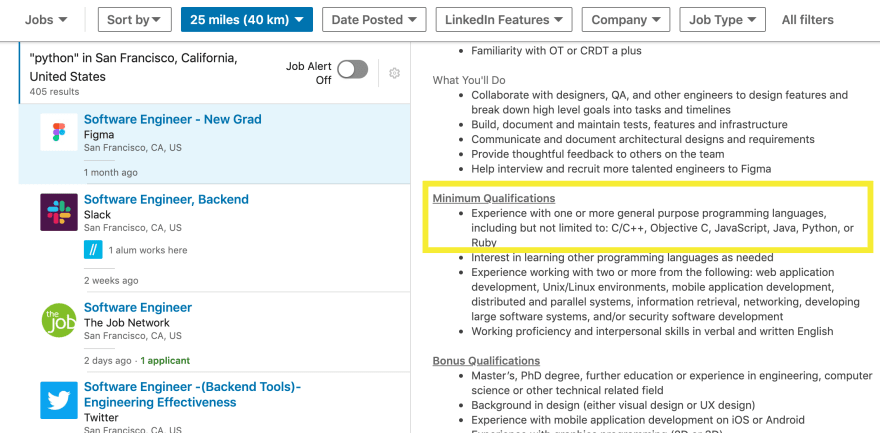Backstory: I'm currently a student at flatiron school, learning full-stack web development. Before flatiron, I was a recruiter for software engineers. As I transition from a technical recruiter to a developer, I am discovering a disconnect between what employers are looking for in candidates, and the skills entry level developers are encouraged to learn. In order to increase my chance of getting a job post-graduation, I decided to check out the real data on what employers are looking for.
Using LinkedIn job postings, I pulled data from all entry level positions in San Francisco for software engineers. Here are the most asked for languages, frameworks and other tools by percentage of job postings.
Languages:
1. Python - 41%
Python has been growing in popularity in recent years, coming in as the second most popular language according to Github. Python is easy to learn and has a large community of users, making it a good intro programming language. Python is also used for data science and artificial intelligence applications. As such, Python has built in libraries for data science, like Numpy, Pandas, and Tensorflow.
2. Javascript - 35%
Javascript enables web applications, and is one of the core technologies of the internet/world wide web. Its popularity stemmed from the need to create interactive web pages, and is now a requirement for most web development. Anyone interested in frontend or full-stack development should put a focus on JS.
3. Java - 27%
Java has been declining in popularity since 2016, although it is still one of the most popular languages to date. Its main use is creating enterprise applications, and is also today to create Android apps. Java was designed with the write once, run anywhere principle. Java is also taught in many degree computer science programs.
4. C++ - 17%
C++ is used today in performant applications, such as games. It is also common in many embedded applications. It's based off of C, but is refactored to be object oriented. It is a high performance language, as it is designed with systems programming in mind.
5. SQL - 17%
SQL or Structured Query Language is a domain specific language for querying relational databases. SQL allows you to create, read, update and delete data tables. Data engineers are typically masters of SQL, while most engineers will have just have some exposure to relational databases.
6. Ruby/Ruby on Rails - 16%
Ruby is hardly seen not on rails, and much of the new development for ruby is based on the rails community. Ruby is a similar language to Python, in that it is object oriented, and was designed to be easy to use. Ruby on Rails is used at a lot of established companies for their web frameworks.
7. Golang - 13%
Go or Golang is a relatively newer language, created by top developers at
Google. Many companies are using Go in their backend, as it is a high performance language. The community is growing for Go, and many companies appear to be looking to start recruiting Go specific engineers.
8. CSS - 12%
CSS or Cascading Style Sheets is a stylesheet language for describing the presentation of an HTML document. CSS is another core aspect of web development, and is a must learn for those interested in front end work.
9. Typescript - 9%
Typescript is another language growing steadily in popularity - its a refactored version of Javascript that scales better for large applications. It is transpiled to javascript for web development, and has gain traction from those tired of javascript's shortcomings.
10. HTML - 9%
HTML or Hypertext Markup Language is the basic building block for web pages. It can be used on its own, or used with CSS and Javascript to make more beautiful and interactive web pages. Similar to Javascript and CSS, HTML is a must learn for web developers.
Frameworks and other tools:
1. React - 33%
React is a Javascript web framework, which has become the most popular framework due to its simplicity and flexibility.
2. AWS - 24%
AWS is Amazon Web Services, which is the largest cloud computing platform. AWS has many uses, including the basic storage capability.
3. Node.js - 21%
Node is a runtime environment for executing Javascript outside of the browser. Node.js is very popular for developers since it allows for using javascript everywhere.
4. Rails - 16%
Rails is a web framework built for Ruby. As mentioned in the Ruby section, it is the main use case today of Ruby. Rails became popular because of its ease of use, and continues to be relevant due to its huge user base and community.
5. Linux/unix - 13%
Linux is a family of open source operating systems, derived from unix operating systems. Companies looking for linux experience are looking for experience developing and working on the platform.
I used filters on 930 entry level jobs in San Francisco with the job title “software engineer” or “developer". It should be noted that many job postings were looking for at least one of many languages, as shown below:
Because this list is using real data from companies that are currently hiring it's a good guide for the current most hirable skills. Other guides have most popular or most used, but that is not representative of the current job market. I hope this helps you in your job search, as I know this information will push me to learn some new things before I start interviewing!




Top comments (1)
This was super helpful information to know! Can't wait to put it to use in our future job search :)